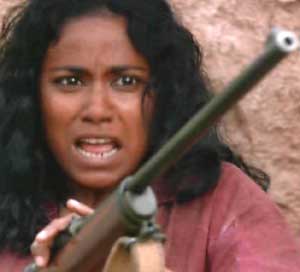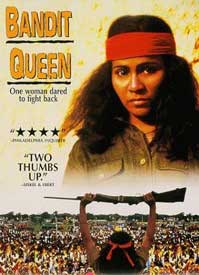 The Kali/Durga-worshipping Mullah outcastes are "untouchables" & frequently turn to banditry. The Thakur are high casted Brahmanic hindus. The Kali/Durga-worshipping Mullah outcastes are "untouchables" & frequently turn to banditry. The Thakur are high casted Brahmanic hindus.
Our Mullah heroine Phoolan Devi (Flower Goddess) spends the first forty minutes of the film being raped & abused in complete overkill conveying her hard life.
When she joins the bandits she's protected by her lover Vikram (Anil Sahu) who helps invent her reputation which, to great extent, this film is convinced was an undeserved reputation.
There follows a half-hour of good if slanted storytelling before it all reverts to gang-rape, beatings, & torture for the s/m crowd.
Phoolan Devi eventually turns to a Muslim bandit king Baha & makes a pitch for having a backer for her own gang. With her lover dead & his enemy in charge of the old gang, she must from now on rely on her own reputation, which she kind of blows by going on a revenge rampage against a Thakur village, without ever getting a chance to kill the guys who raped her & killed Vikram.
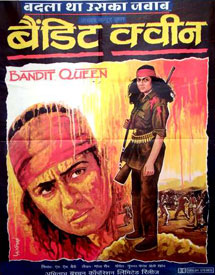 Baha turns against her after the mindless slaughter. Phoolan Devi seems to have no redeeming merits, but she is nevertheless admired by the lower castes, though the film fails to indicate why that would be. Baha turns against her after the mindless slaughter. Phoolan Devi seems to have no redeeming merits, but she is nevertheless admired by the lower castes, though the film fails to indicate why that would be.
A government official concludes, re. outcastes, "They vote too!" & offer her an opportunity to surrender under purportedly favorable conditions.
(Since historically she served eleven years in prison without ever having her alleged crimes proven in court -- indeed, all charges were eventually withdrawn & she was pardoned -- it's not like she got off as scott-free as the film script implies.)
The Bandit Queen (Phoolan Devi, 1994) is a physically beautiful film, & Seema Biswas as Phoolan has a tough beauty perfect for such a wild figure. Nor is the movie afflicted in any manner with Bollywood campiness. At no time do bandits break into pasty-faced dance & song. What music exists on the soundtrack is by the late great Ali Khan, a simply tremendous score.
Though Seema Biswas was perfect casting, she is dragged through a script full of falsity. The film's fatally flawed by its director's delight in showing Phoolan Devi repeatedly abused. Such awful things were part of her history, but the director gives a totally incorrect impression by delving gleefully into the rape & torture, while skipping or underplaying the historical Phoolan Devi's very real strengths as a rebel, bandit, & a figure who understandably came to be worshipped by India's underclasses.
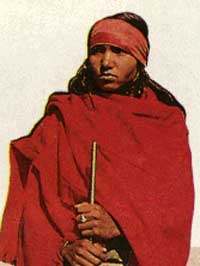 There was a human rights aspect of Phoolan Devi's actual biography, such as this film's director overlooks to the point of parodying her worst attributes while admitting to no positive elements to her personality or achievement. There was a human rights aspect of Phoolan Devi's actual biography, such as this film's director overlooks to the point of parodying her worst attributes while admitting to no positive elements to her personality or achievement.
Phoolan herself (shown here at the left, as beautiful as the actress who played her) deplored the derogatory portrait promulgated by this phony bio-pic. A viewer will find no hint of Phoolan's spiritual side or her interfaith interests as a student of saktism, buddhism, sikhism & christianity. Nothing in the film would lead to any comprehension of how it was Phoolan came to be quite rightly a friend of Mother Theresa.
Those closest to her claimed she was good-hearted & highly sensitive to others' suffering, something you'd never guess from the film's derogatory misrepresentation. The fact that the film is so well made somewhat disguises its high-caste favoritism & political disdain for a woman less "disturbed" & more heroic than the film allows.
Instead of the historical Phoolan Devi, we're shown a history of rape & abuse to explain how Phoolan became psychotic. Yet the historical Phoolan was not psychotic, & the film never once conveys how it was that she came to her position of adoration.
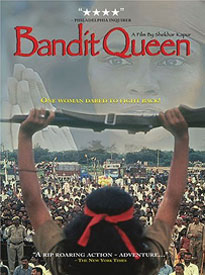 The film is essentially a high caste interpretation of an outcaste heroine, showing no comprehension of saktists or kali-worshippers or the underclasses. The film is essentially a high caste interpretation of an outcaste heroine, showing no comprehension of saktists or kali-worshippers or the underclasses.
If her actual history had mattered to the disapproving filmmaker, we might've seen a few of her crowd-pleasing exploits & not focused exclusively on the worst elements of her complex life. Once when her gang was robbing a bank, she went up to the bank's roof & sang for the crowd.
If just that one episode from her actual biography had been reenacted, we might have had some slight understanding of her charisma, & how she came to be regarded as a rebel goddess & protector of the downtrodden.
After Phoolan's release from prison she became an effective politician fighting for the rights of Untouchables. She forged major inroads for the underclasses in politics. She declared politics to be more corrupt & criminal than banditry, & she had no shame in having been a bandit. She was assassinated in 2001 returning to Parliament from a lunch break, & India's low caste masses grieved intensely.
What the film teaches us is that a life marred by rape & torture from childhood onward will create a monster. But what Phoolan Devi's actual life means is far more inspiring, for it tells us that no degree of oppression can stop the spirit of rebellion & the thirst for justice & equality. Her life is even to some extent reassuring that in modern Democratic India, even the lowest outcaste can rise to the highest levels of government. Shame on Shekhar Kapur for his misrepresentation of a startling & great figure of Indian history.
copyright © by Paghat the Ratgirl
|
